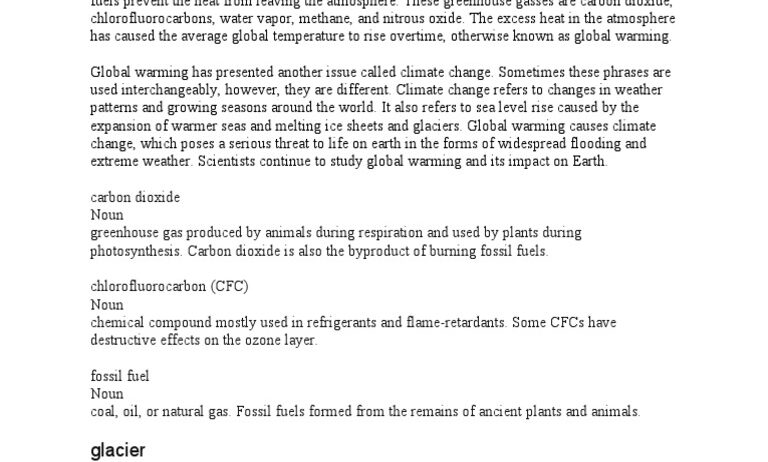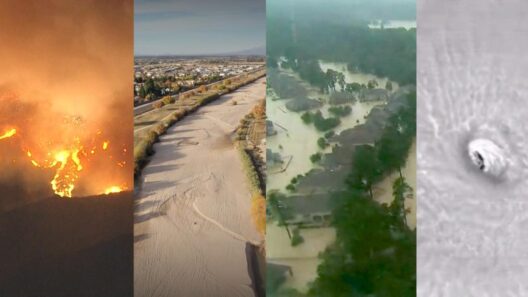Language is a powerful tool, one that shapes our perception and understanding of complex issues. When it comes to environmental topics, the nuances of grammar can influence not only clarity but also the perceived significance of the subject matter. One question that often arises is whether to capitalize terms such as “global warming.” To unravel this inquiry, we need to delve into grammar rules, context, and the broader implications of our language choices.
To begin with, let’s consider basic grammar principles. In standard English usage, certain words are capitalized based on their function in a sentence. Proper nouns, for example, are capitalized to identify specific entities or individuals. In this context, terms such as “Earth,” “America,” or “Socrates” warrant capitalization because they denote particular, identifiable subjects. Conversely, general nouns typically remain lowercase unless they appear at the start of a sentence.
Global warming, as a term, presents a slightly unique case. It refers to the observed increase in Earth’s average surface temperature due to the accumulation of greenhouse gases in the atmosphere. This scientific phenomenon has garnered immense attention over the years, shaping environmental policies and debates. When considering the capitalization of “global warming,” we must also take into account its usage in context.
In scientific literature and academic discourse, “global warming” is frequently presented in lowercase. This aligns with the convention of treating scientific terms as common nouns. Such usage emphasizes the term’s role as a descriptor of a widely studied phenomenon rather than naming a specific event or entity. Therefore, in these contexts, one would typically write: “The effects of global warming are increasingly visible.”
On the other hand, usage can vary depending on the context. For example, when “Global Warming” is used as part of a title—say, in a report or publication—it may be capitalized. Moreover, within certain organizations or movements, “Global Warming” may emerge as a branding strategy, emphasizing its urgency and importance. In this regard, capitalization serves not merely to adhere to grammatical rules but to signify a collective recognition of the term’s relevance to the global conversation on climate change.
This differentiation prompts a broader consideration: language and framing significantly influence public perception. The choice to capitalize “global warming” can denote a shift in perspective, framing the topic as a matter of substantial collective concern. Alternatively, using lowercase might render it a more subdued subject, perhaps lessening the perceived urgency among audiences.
Furthermore, one cannot ignore the role of journalists and communicators. Throughout media and popular writing, it is common to encounter variations in capitalization based on editorial style guides. Publications may have specific guidelines that dictate how terms like “global warming” are treated. The Associated Press Stylebook, for instance, usually suggests lowercase unless used in the context of a title or headline. Such guidelines underscore the importance of consistency in communication.
As a principle, it becomes essential to consider your audience when deciding on capitalization. In formal scientific writing directed toward specialists, lowercase is appropriate, maintaining a tone of objectivity. Yet, when addressing a broader audience through articles, blogs, or social media, capitalizing the term may invoke a heightened sense of urgency and importance. Observable language choices can reportedly incite curiosity, prompting readers to engage with the content more fervently.
Let us take this one step further. The discourse surrounding climate change is rife with jargon. Terms like “carbon footprint,” “climate change,” and “global warming” often blend into a singular narrative. By examining terms in detail—allowing nuances to emerge—we can uncover meanings that may otherwise be hidden. Capitalizing on language can be a conduit for inviting reflection. For example, when thoughtfully used, phrases like “Global Warming” may beckon a deeper inquiry into the responsibilities of individuals, corporations, and governments.
We may also want to traverse the realm of alternative terminology. Phrases such as “climate crisis” or “climate emergency” are increasingly employed to evoke a sense of immediacy. These terms often capitalize on emotional resonance, compelling readers and listeners to act. While they may differ in nuance from “global warming,” they still draw on the same predicate of environmental awareness.
Lastly, consider the global implications of our language. In a world rich with diverse cultures, the term “global warming” can resonate differently depending on geographical context. Regions that are more dramatically affected by climate phenomena may exhibit a greater awareness and urgency concerning the term. Thus, understanding local nuances can inform how you communicate about these critical issues.
In conclusion, the decision to capitalize “global warming” is far from trivial. It operates on multiple levels—grammar, context, audience perception, and socio-political implications. Whether you choose to advocate for its capitalization or favor lowercase, it is paramount to remain cognizant of the broader linguistic landscape as it pertains to environmental discourse. The language we employ not only reflects our understanding of climate issues but also shapes the dialogues surrounding our collective future. Thoughtfully employing terminology can catalyze curiosity and highlight the pressing challenges posed by climate change, urging a paradigm shift in perspective necessary for meaningful action.






